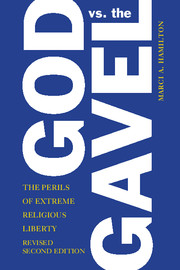Book contents
Epilogue: Follow the Money
Published online by Cambridge University Press: 05 November 2014
Summary
As with everything else in American society, it pays to follow the money.
There is no natural limit on believers’ sense of entitlement today, and it now extends to the free market, business, and money. RFRA was launched because legislators supposedly would not accommodate Native American Church use of peyote after Smith. Its creators were wrong about that, but the RFRA ethos contributed toward the narcissistic sense of entitlement that soon exceeded any supposed lack of religious liberty for the plaintiffs in Smith.
The original RFRA’s legislative history contained a few anecdotes about individual Hmong and Orthodox Jews objecting to the autopsies states require when there is a suspicious death. The Hmong believe that the physical invasion inherent in conducting an autopsy inhibits the body’s path to the afterlife, and “unnecessary” autopsies violate Orthodox Jewish beliefs, because the Talmud forbids “mutilating” the dead. Then Congress was told that extreme religious liberty for land use was necessary to help a minyan (a small group of Jewish men meeting to pray each morning) meeting in a home in a residential neighborhood, because they must walk and so that houses of worship could be built without discrimination. RFRA, RLUIPA, and the state RFRAs are sold as though underdog believers needed Congress’s assistance. The deep irony, of course, is that while the politically powerful mainstream members of the Coalition for the FreeExercise ofReligion demandedRFRAin Congress, the little Native American Church was winning peyote exemptions in legislatures across the country.
- Type
- Chapter
- Information
- God vs. the GavelThe Perils of Extreme Religious Liberty, pp. 347 - 360Publisher: Cambridge University PressPrint publication year: 2014



